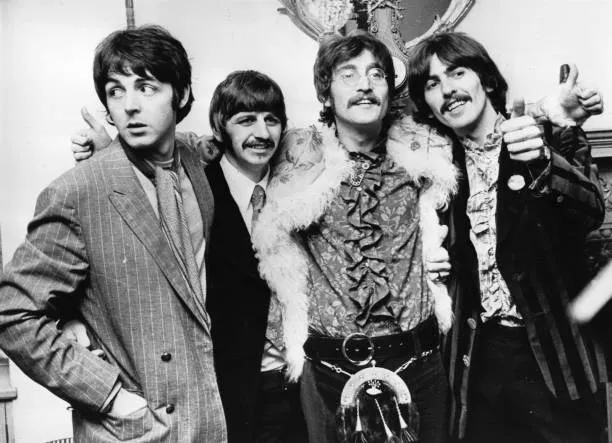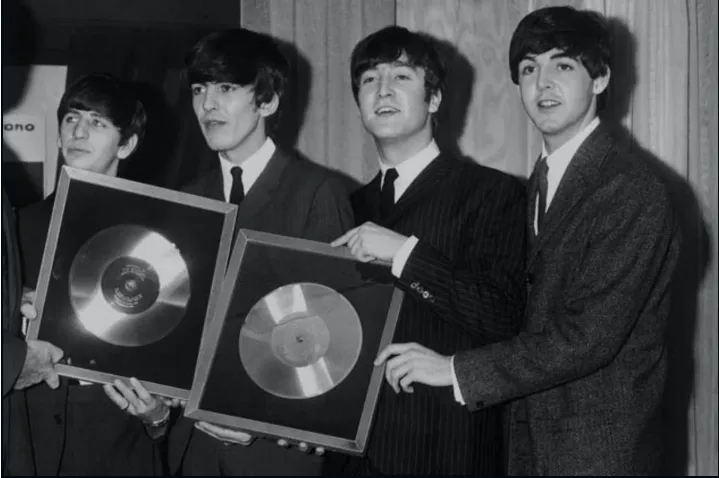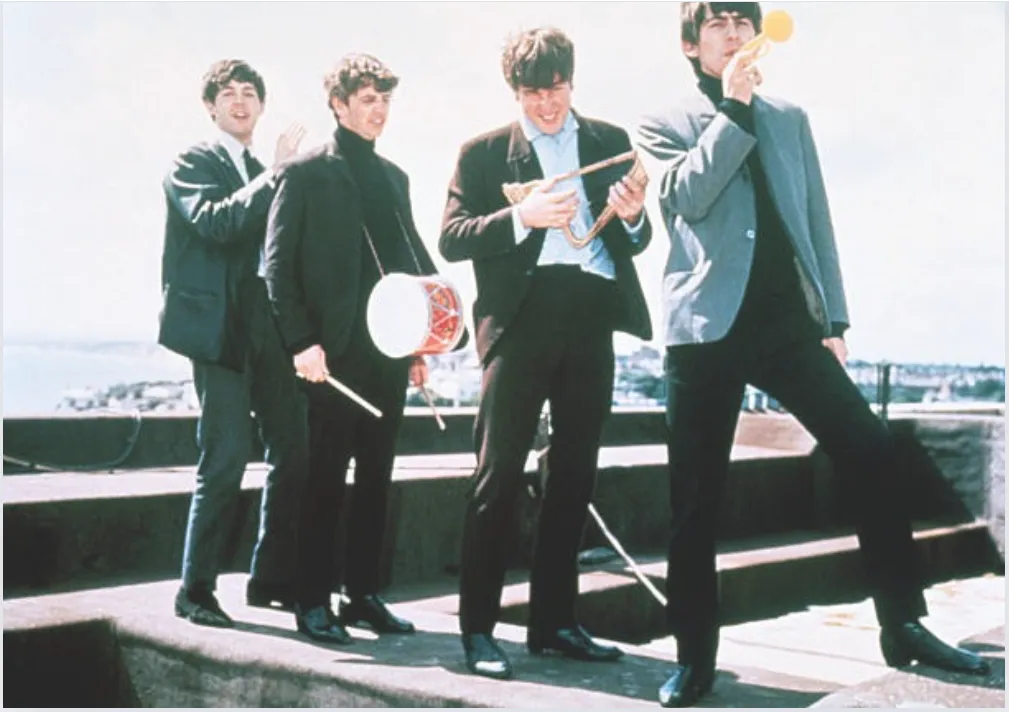When it comes to influential bands that have left an indelible mark on popular music, The Beatles undoubtedly top the list.
Emerging from Liverpool in the early 1960s, The Beatles—comprising John Lennon, Paul McCartney, George Harrison, and Ringo Starr—transformed the musical landscape with their innovative sounds and thought-provoking lyrics.
But beyond their well-known hits and cultural impact, there are numerous interesting facts about The Beatles that add layers to their already rich history.
Here are five fascinating facts about The Beatles that might surprise even the most ardent fans.
1. The Origins of The Beatles’ Name
One of the most intriguing The Beatles facts revolves around the origin of the band's iconic name.
Before they were known as The Beatles, the group went through several name changes. Initially, they were called The Quarrymen, named after John Lennon's school, Quarry Bank High School.

Over time, they experimented with various monikers, including Johnny and the Moondogs, The Silver Beetles, and The Beatals.
The final name, "The Beatles," was a play on words. It combined the insect “beetles” with the musical term “beat," reflecting their innovative blend of rock and roll rhythms.
The name was partly inspired by Buddy Holly's band, The Crickets, but had a unique double meaning that hinted at the sound revolution they were about to unleash on the world.
John Lennon was particularly fond of words and their multiple meanings.
The decision to use "beat" within their name struck a chord with him, as it not only connected to music but also symbolized their intent to be at the forefront of the beat generation.
This clever wordplay encapsulated their forward-thinking mindset and artistic innovation.
2. The Beatles Once Recorded a German Language Album
Here's a lesser-known The Beatles fact: they recorded songs in German! As part of their early career, The Beatles spent considerable time in Hamburg, Germany, playing in clubs and honing their musical skills.
This period was crucial for their development as musicians, offering them the opportunity to fine-tune their live performances and build a loyal following.
To capitalize on their growing popularity in Germany, their record label, EMI’s German affiliate Odeon, suggested they record some of their hit songs in German.

In 1964, The Beatles re-recorded two of their hits, "She Loves You" and "I Want to Hold Your Hand," in German, resulting in the tracks "Sie Liebt Dich" and "Komm, Gib Mir Deine Hand."
Recording in another language was no small feat. The band members had to learn the German lyrics phonetically, as they did not speak the language fluently.
Despite this challenge, they delivered compelling versions of the songs that maintained the original’s energy and charm.
These versions did not achieve the same level of fame as their English counterparts but demonstrated The Beatles' willingness to embrace international markets and adapt their music for diverse audiences.
3. The Beatles Refused to Play Segregated Audiences
In an era when racial segregation was rampant, The Beatles took a principled stand against it.
When planning their 1964 tour of the United States, the band discovered that some venues were segregated, meaning audiences were separated by race.
This practice was antithetical to The Beatles' values and beliefs in equality and inclusion.
Refusing to perform for segregated audiences, The Beatles included an anti-segregation clause in their contract.
This courageous stance not only reflected their commitment to social justice but also marked them as pioneers in the fight for civil rights.

By insisting on integrated audiences, The Beatles helped challenge and eventually change societal norms.
This stance was particularly significant during their performance at the Gator Bowl in Jacksonville, Florida.
Initially, the audience was set to be segregated; however, The Beatles made it clear that they would not perform unless the crowd was integrated.
Their insistence led to a landmark performance that was celebrated for both its musical brilliance and its social implications.
The Beatles' rejection of segregation extended beyond the stage.
They were vocal about their support for the Civil Rights Movement and expressed their belief in equality during interviews and public appearances.
Their actions and words inspired many and highlighted the power of music as a catalyst for social change.
4. The Influence of the Maharishi and Transcendental Meditation

Another intriguing aspect of The Beatles facts is how Eastern philosophy and transcendental meditation profoundly influenced their music and lives.
In 1967, The Beatles met Maharishi Mahesh Yogi, an Indian guru who introduced them to transcendental meditation.
Seeking spiritual growth and a respite from the pressures of fame, the band members traveled to Rishikesh, India, in 1968 to study under the Maharishi.
This period of introspection and learning had a lasting impact on The Beatles' music.
Their time in India inspired numerous iconic songs featured on the "White Album," including "Dear Prudence," "Sexy Sadie," and "While My Guitar Gently Weeps."
The incorporation of Indian musical elements and themes of self-discovery and spirituality marked a significant evolution in their artistic journey.
The Maharishi's teachings on meditation and the benefits of achieving a higher state of consciousness resonated deeply with the band members.
They immersed themselves in daily meditation practices and absorbed the philosophical teachings presented to them.
This spiritual exploration led to a renewed sense of creativity and purpose, which is evident in the music they produced during and after their stay in India.
Furthermore, their interest in Eastern philosophy and transcendental meditation influenced their lifestyle and outlook.
They adopted a more holistic approach to life, emphasizing inner peace, mindfulness, and a deeper connection to the world around them.
This shift in perspective not only enriched their music but also contributed to their growth as individuals.
5. The Conceptual Innovation of “Sgt. Pepper’s Lonely Hearts Club Band”

"Sgt. Pepper’s Lonely Hearts Club Band" is often hailed as one of the greatest albums in the history of popular music, and one of the most interesting The Beatles facts centers on its conceptual innovation.
Released in 1967, the album represented a groundbreaking departure from traditional rock music formats and themes.
The concept of the album was born from Paul McCartney's idea of creating an alter-ego band that would perform the songs.
This allowed The Beatles to experiment with different musical styles and abandon the constraints of their established image.
The album's seamless transitions between tracks and its thematic coherence were revolutionary, setting the stage for the modern concept album.
The recording sessions for "Sgt. Pepper’s" also saw the use of innovative studio techniques and experimental instrumentation.
The band employed everything from sitars and harmoniums to tape loops and sound effects, crafting a rich, multi-layered sonic tapestry.
This creative freedom resulted in timeless classics like "Lucy in the Sky with Diamonds," "A Day in the Life," and "With a Little Help from My Friends."
Producer George Martin played a crucial role in bringing the album’s innovative vision to life.
His technical expertise and willingness to experiment with new recording techniques enabled The Beatles to push the boundaries of what was possible in the studio.
The album’s intricate arrangements and pioneering use of studio technology set a new standard for music production and influenced countless artists in the years to come.
The Enduring Legacy of The Beatles

The Beatles' legacy is built upon not only their extraordinary music but also their cultural and social contributions.
These five The Beatles facts offer a glimpse into the myriad ways the band pushed boundaries and transformed the world around them.
From their clever nameplay and linguistic adaptability to their strong moral principles, spiritual explorations, and groundbreaking concepts, The Beatles consistently demonstrated their originality and influence.
Today, The Beatles continue to inspire musicians, artists, and fans around the globe.
Their music remains a testament to the power of creativity and the importance of challenging the status quo.
As we reflect on these fascinating facts, we gain a deeper appreciation for the band's remarkable journey and the enduring impact of their timeless art.



